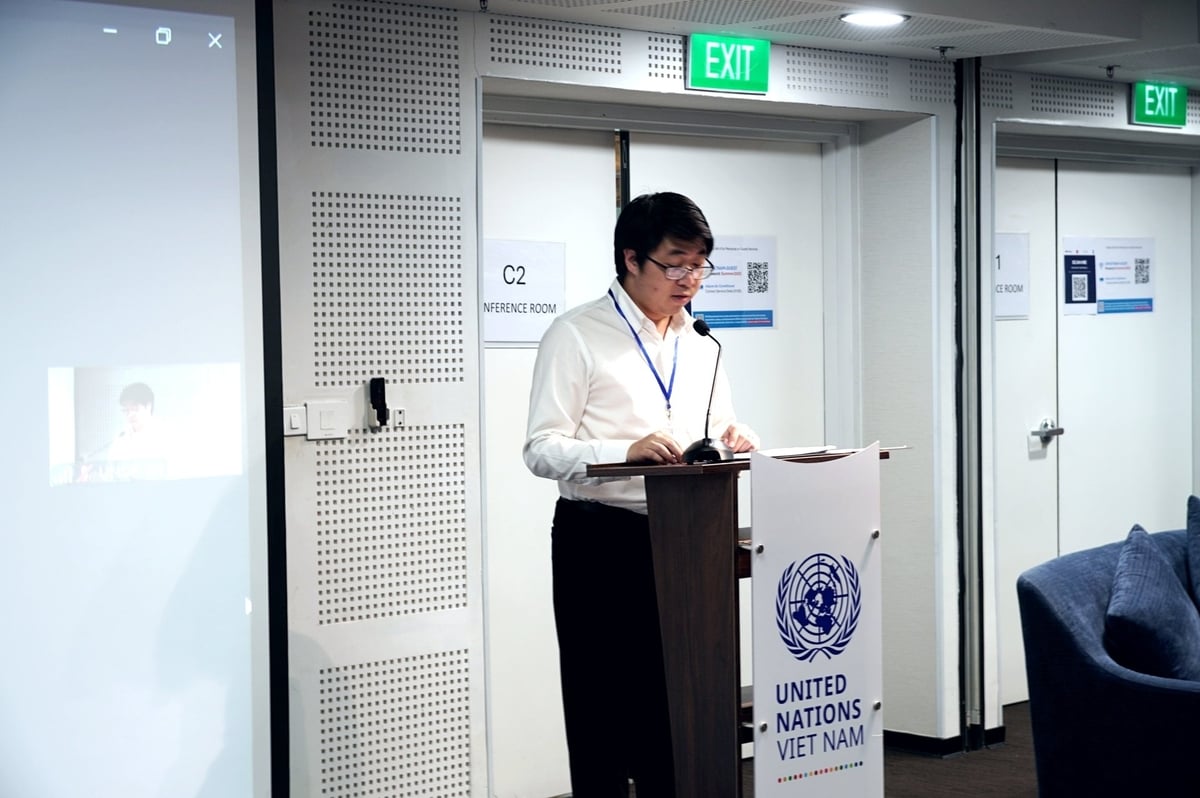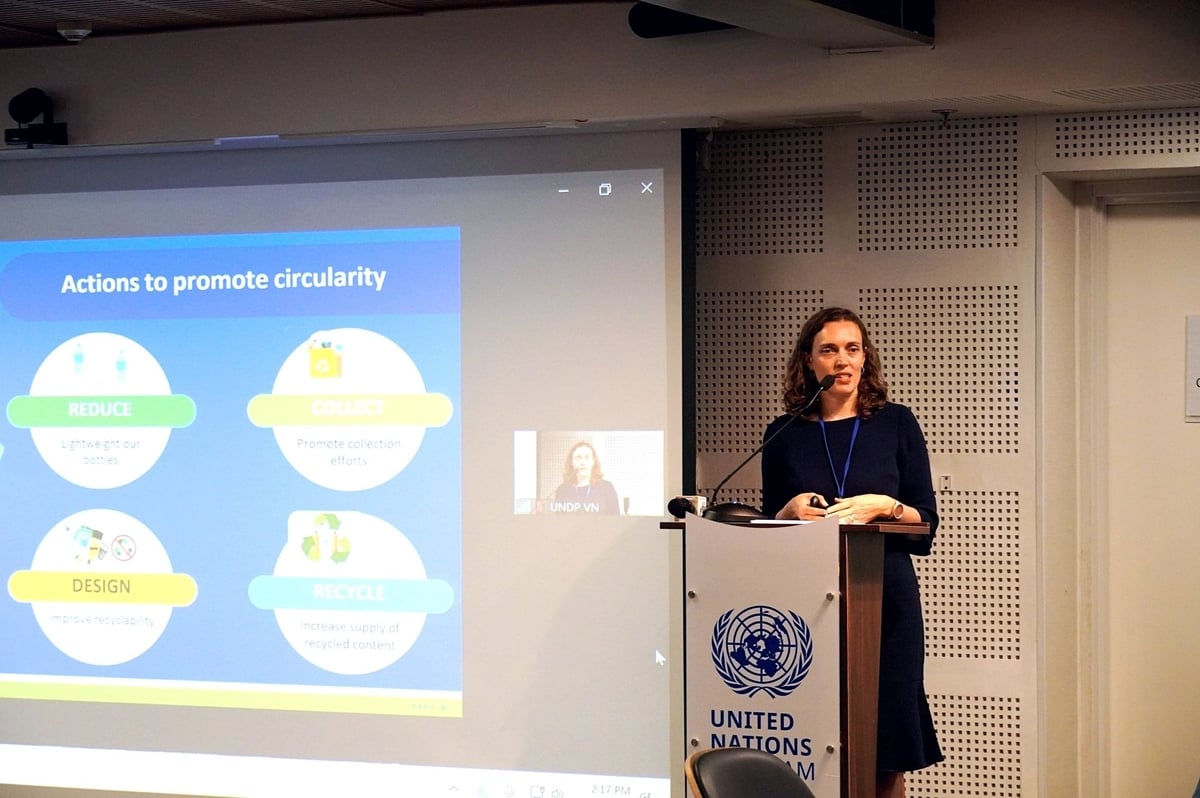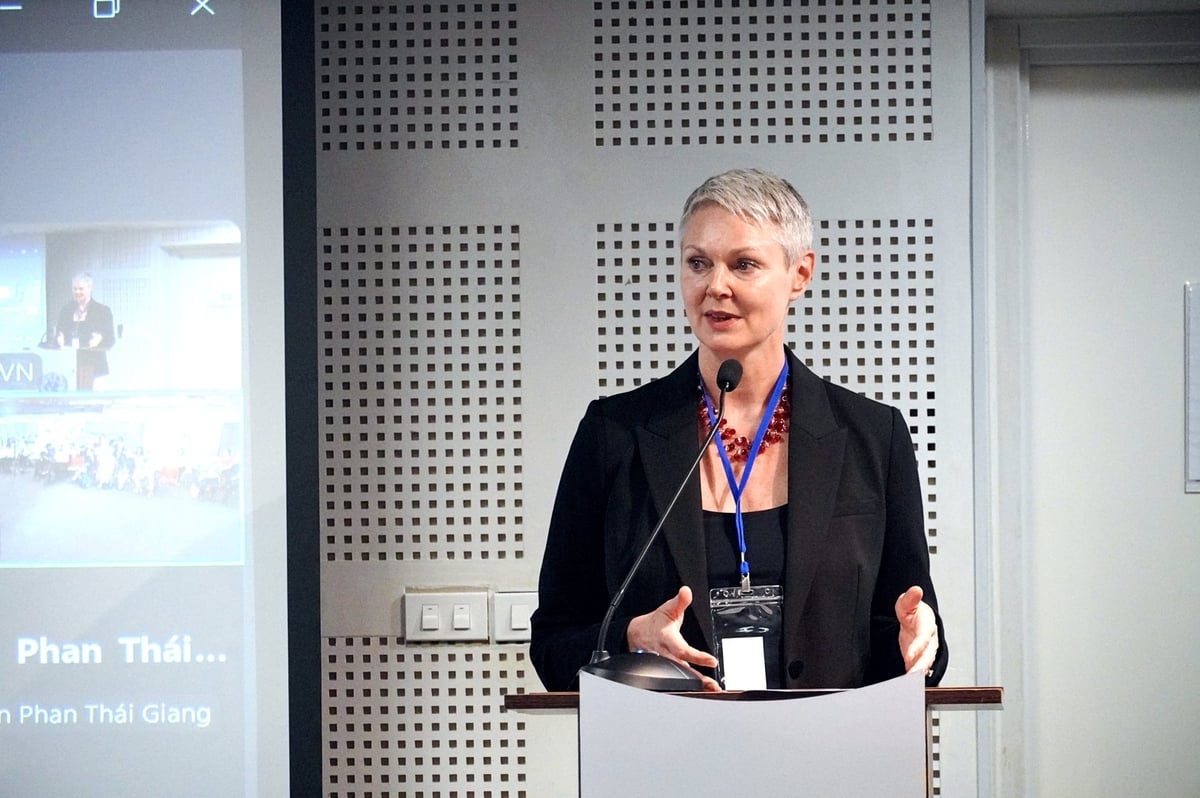June 19, 2025 | 00:41 GMT +7
June 19, 2025 | 00:41 GMT +7
Hotline: 0913.378.918
June 19, 2025 | 00:41 GMT +7
Hotline: 0913.378.918
On June 16, the Ministry of Agriculture and Environment, in collaboration with the United Nations Development Programme (UNDP), the Vietnam National Plastic Action Partnership (NPAP), and the Embassy of Norway, held the second and final session of the Plastic Talk series, themed “Closing the post-consumer plastic loop,” and officially launched a study on a Deposit Return Scheme (DRS) tailored to Vietnam.
The talk series is part of the 2025 World Environment Day celebrations, under the theme “Beat Plastic Pollution”. It aims to share practical solutions to promote a circular plastic economy. The program focused on business-led initiatives such as recycling low-value plastics, deploying advanced waste sorting and treatment technologies, and using post-consumer recycled (PCR) materials as new production inputs.
In his opening remarks at the session, Mr. Vu Duc Dam Quang, Deputy Director of the International Cooperation Department (Ministry of Agriculture and Environment), emphasized that Vietnam is facing an increasingly serious plastic pollution challenge, which requires a comprehensive overhaul of the plastic product lifecycle management system. Transitioning to a circular model is not simply about improving waste treatment, but about redesigning the entire value chain—from production to consumption—to transform plastic from an environmental burden into a reusable resource.

Mr. Vu Duc Dam Quang, Deputy Director of the Department of International Cooperation (Ministry of Agriculture and Environment), delivered the opening speech at the session. Photo: NPAP.
In response to this spirit, the businesses participating in the discussion presented their roadmaps for transitioning to the use of PCR materials in packaging. Ms. Anke Boykin, Senior Director of Global Environmental Policy at PepsiCo, stated that the company is implementing a 3R strategy: Reduce, Recycle, Renew.
Vietnam is a pioneer market for PepsiCo in using 100% recycled plastic bottles. As of April 2022, PepsiCo Vietnam has been using bottles made entirely from recycled plastic, making it the first entity in Vietnam and the Asia-Pacific region to implement this model.
Ms. Boykin emphasized that expanding the circular model not only brings environmental benefits but also creates economic opportunities by reducing the volume of low-value plastic waste, lowering the carbon footprint of packaging, and generating jobs for collectors and soft plastic waste processors.
However, to realize PCR models, Vietnam needs effective design policies to encourage investment, reduce financial risks, and facilitate public-private cooperation. This includes incentives for circular bottle-to-bottle recycling, connecting the informal collection sector, and ensuring the rights and benefits of workers.

Ms. Anke Boykin, Senior Director of Global Environmental Policy at PepsiCo, presents the company’s plastic circularity strategy. Photo: NPAP.
At the event, other businesses, including Unilever Vietnam, also announced their goal to achieve 100% PCR content in their packaging, while Indorama Ventures Vietnam introduced methods to develop a closed-loop recycling system for post-consumer PET bottles.
Also during the event, a study on a Deposit Return Scheme suitable for Vietnam’s conditions was unveiled. Funded by the Embassy of Norway and conducted by Eunomia Research & Consulting, the study introduced the DRS mechanism as a key component of the circular economy model in Vietnam.
Under the DRS mechanism, consumers pay a small deposit when purchasing bottled or canned beverages, which is refunded when they return the empty bottles or cans to collection points. These packaging materials are then counted, sorted, and sent to recycling facilities, helping to increase the quantity and quality of recycled materials and reduce environmental littering.
Accordingly, to pave the way for implementing the Deposit Return Scheme in Vietnam, the study analyzed beverage sales, recycling, and waste collection activities in both the formal and informal sectors. Data were collected through surveys, interviews with stakeholders, document analysis, revenue data, and consultation workshops on system design.
The study’s findings indicate that Vietnam generates approximately 25 million tons of municipal solid waste annually, with 60% of this waste originating from urban areas. This volume increases by 10–16% each year, particularly in cities, industrial zones, and tourist regions. However, waste collection and treatment infrastructure remain limited: only about 84–87% of waste is collected in urban areas, 40–63% in rural areas, and less than 10% in remote and mountainous regions.

Ms. Hilde Solbakken, Ambassador of Norway to Vietnam, speaks at the session. Photo: NPAP.
Only about 10-15% of municipal solid waste is recycled, most of which is “downcycled,” meaning it cannot be turned back into products of equivalent quality. Approximately 83% of recycled plastic waste comes from informal sector activities. However, due to a lack of traceability and quality control, recycled materials from this sector struggle to contribute to a truly closed-loop circular model.
Therefore, experts recommend implementing a mandatory DRS, led by the industry, applying to single-use PET bottles and aluminum cans. The proposed deposit refund amount is 1,000–2,000 VND per item. If effectively implemented, this system could help reduce over 77,000 tons of packaging waste annually, cut 265,000 tons of CO₂ equivalent emissions, and create 6,400 formal jobs along with nearly 10,000 opportunities for informal workers.
Additionally, experts recommend that the DRS's design aligns with Vietnam’s Extended Producer Responsibility (EPR) policy, thereby contributing positively to the goals of reducing marine plastic pollution and achieving net-zero emissions by 2050.
Speaking at the talk, Ms. Hilde Solbakken, Ambassador of Norway to Vietnam, said:“In Norway, the deposit return system has helped us achieve one of the highest plastic bottle recycling rates in the world - over 90%. Across Europe, similar systems have proven that smart design combined with strong public engagement, including the business sector, delivers real and positive environmental outcomes. I believe that with increasing commitments to sustainability, Vietnam can greatly benefit from these proven models, thereby boosting recycling rates and effectively addressing plastic pollution."
Translated by Phuong Linh

(VAN) According to the Binh Thuan Department of Industry and Trade, in the first five months of 2025, Binh Thuan's dragon fruit export turnover increased by 20.65% compared to the same period last year.

(VAN) EU countries on Thursday gave final approval to new tariffs on fertilizer imports from Russia, a move aimed at cutting off revenue that could support Moscow’s war in Ukraine, despite concerns from European farmers.

(VAN) The working delegation from the Ministry of Agriculture and Environment conducted an important trip to the Netherlands to strengthen strategic partnerships and sustainable development in the agricultural sector.

(VAN) The letter ‘A Plea from the Ocean’ not only evokes emotion but also awakens the human conscience to the responsibility of protecting life on Earth.

(VAN) The Department of Agriculture in South Africa has announced the country’s first mass vaccination of poultry to prevent local birds from contracting avian influenza.

(VAN) Establishment of the Mekong Delta Regional Agricultural Linkage Center, aiming for a closed value chain, deep processing, trading platforms, and international market connectivity.